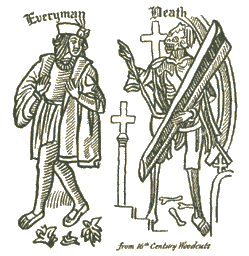Itinerant Svither

.
Lady Steed and I are away from home this week, and, well, nothing lends itself to metaphor like traveling.
Like many things on The List, I have never read Everyman--at least not in its entirety. Or at least not that I recall. But I don't really recall that much anyway. And that's not the point. The point is that Everyman is about as archetypal as you can get when looking back at the great religious traveling metaphors and so I will be plundering it.
(Curiously, I intended to write a post on the importance of the public domain yesterday and how current copyright law's stinginess is terrible for intellectual discourse, but didn't get to it. Consider this, in addition to a scintillating metaphor, a dry run at that as well.)
 was living his regular life, walking to and fro, neglecting his God in lieu of his work, neglecting his work in lieu of his family, neglecting his family in lieu of his ego, neglecting his ego with nothing like frequency.
was living his regular life, walking to and fro, neglecting his God in lieu of his work, neglecting his work in lieu of his family, neglecting his family in lieu of his ego, neglecting his ego with nothing like frequency.- Enter Death.
Death: THERIC.
Theric: I'm busy.
Death: LOOK AT ME.
Theric: (Sighs.) What? (Turns to looks.) Oh. Shoot.
Death: NO, ANEURYSM.
Theric: So I wasn't being irrational when I worried about dropping dead of one of those things.
Death: NO.
Theric: Figures. (Hits "Save" on the computer.) Well, how much time have I got?
Death: TIME?
Theric: Yeah, you know, time. That stuff we got to do the stuff we got to do before you show up.
Death: AH, THAT TIME. (Chuckles.) I AM HERE, AREN'T I?
Theric: Mm. I see. Look, I hope this doesn't sound shallow, but would you be interested in being profiled on my blog? It might take a little while to make it right but I'm sure that y---
Death: IF I FELL PREY TO EACH SUCH PETTY REQUEST, THE WORLD WOULD BE OVERRUN WITH BLOGGING!
Theric: The world already is overrun with blogging.
Death: THE WORLD WOULD BE MORE OVERRUN WITH BLOGGING!
Theric: I dunno. Overrun is overrun. It seems kind of like "unique" to me--can something really be more overrun?
Death: SILENCE!
Theric: Sorry. I think I'd heard you like quiet.
Death: YES.
Theric: Right.
Death: COME.
Theric: Right. Um. Shoot.
Death: ANEURYSM.
Theric: I know, I know. I'm just thinking.
Death: THINK ON THE WAY.
Theric: On the way, right, right. Um. I. Um. Hey! Say, Death?
Death: YES?
Theric: Are you good company?
Death: COMPANY?
Theric: Yeah, so myrie a compaignye and so forth?
Death: I SHOULD SAY NOT.
Theric: Ah, pity, pity. Say, could I bring someone with me? Someone who would not forsake me to his lyues ende in the waye of good company and so forth.
Death: YOU TALK FUNNY.
Theric: Writer.
Death: AH.
Theric: Anyway, what do you say?
Death: VERY WELL. BUT MAKE IT QUICK. I HAVE ONE HUNDRED AND THREE PEOPLE TO PICK UP THIS MINUTE.
Theric: Are you serious? Wow. Anyway, I'm on it.
Fortunately, luck was with Theric. Little green circles were next to Luck, Chums, Obscene Wealth and Good Works. He decided to pretend to be casual and greeted each with a "Hey." Four little chat boxes popped up on his screen.
Like normal, Obscene Wealth ignored him, but the other three were quick to reply.
Then, like petrified centuries being dragged over the dried vertebrae of a long-dead jackal, Theric heard Death tapping his fingers on his scythe. So he got to the point quickly, holding these conversations simultaneously:
- Theric:Hey.
Luck: Wassup?
Theric: Doing anything?
Luck: Nothing that can't be set aside for you.
Theric: Sweet. Look, I'm about to die of an aneurysm and--
Luck: Die?
Theric: Yeah, Death's here right now and--
Luck: Dude, sorry. Me and Death....noway.
Theric: He said I could take somebody along with me!
Luck: I don't travel with Death. Nothing personal.
Theric: It's personal to me.
Luck did not receive your message.
* * * * *
Theric: Hey.
Chums: Hey.
Theric: I need a favor.
Chums: You're there for me, I'm there for you.
Theric: Death's taking me. He says I can take someone with me. You doing anything?
Chums: Death? Can I come back?
Theric: I'll check.
He says NO.
Chums: Hmm.
Theric: He says I won't be coming back either, though.
Chums: *thinking*
Theric: What do you say?
Chums: In fayth I wyll not come there If deth were the messenger For no man that is lyuynge to daye I wyll not go that loth iournaye. Not for the fader that bygate me.
Theric: What?
Chums: Sorry--typing too fast.
Point was I can't make it. Not today.
Theric: I bet Master Fob would come with me.
Chums: Then ask him.
Theric: He's not online.
Chums did not receive your message.
Theric: Crap.
* * * * *
Theric: Hey.
Good Works: And I remember well when you helped your grandfather feed the cows in those cold winter mornings.
Theric: Really? Thanks. Hey, I got a favor to ask.
Good Works: Inasmuch as you have done it unto me, and so forth.
Theric: Right. Great.
Look, Death is here with me and he says I can take someone with me.
Good Works: True. He's right about that. Who are you going to take?
Theric: I'm on with you and Chums and Luck right now.
Good Works: Luck? No kidding?
Theric: Yeah, why do y
Nevermind, he just left.
Good Works: I knew it. Luck isn't quite like Chums or me.
Theric: Will you come?
Good Works: You know, I would love to. I really would. But I've been sick lately. In fact, I can't remember the last time we even talked.
Theric: It has been too long....
Good Works: If only you could help me, I would go.
Theric: Hmm.
Got it. What if I log into PayPal right now and give whatever's in there to the Humanitarian Fund?
Good Works: Try it.
Theric: Okay, I'm on it.
There goes Chums....
Man this Death guy's all over me!
Good Works: He's not as patient as some of us.
Theric: I'll say....
It's done.
Good Works: I can tell. I will go.
Theric: Thanks. Meet me here.
Good Works: Yes.
Theric: Hooray!
Good Works did not receive your message.
Anyway, to make a long story only a little longer, Theric prayed. And, knowing he was about to meet the prayee in a few minutes, he thought a little more about what exactly he meant as he formed the words. And as he thought about those words, he realized that too often had he frittered words, words which were among the greatest gifts the prayee had given him.
Theric was the sort to define his life by the words that filled it. And now, as he prayed, he realized that his pie chart of words had way too big a slice of Touting Theric and way too small a slice of Supporting Others.
Theric cracked his eyes and peeked at Good Works. She was obviously still unwell, $91.46 or no $91.46. He thought of how his words could have made her strong. How she was the only one who was willing to make this journey with him yet he had done so little for her.
Theric quickly closed his prayer, stood, and walked to her. He got under her shoulder, put his arm around her waist and helped her walk to the door. Death slipped ahead and gestured to a path that led from the door and disappeared into the unfathomable distance.
Good Works smiled and Theric took courage.
- Good Works: I will be fine, Theric.
Theric: No I--
Good Works: Theric, shush. I will be fine. But everyone is dying, everyday. All lives are but journeys to a single end. If now, at this moment, you find yourself strong enough to carry another, then you are strong enough to carry another each day along the journey. (Good Works gestures out the door and down the path.) Along that road are many who will need help to make the journey--some may even need to be carried. Will you help them?
Theric: Of course, but--
Good Works: Theric, no. Will you help them?
(Beat.)
Theric: Yes.
Good Works: Good. Now, do you remember what I said in our chat?
Theric: In our chat?
Good Works: About the least of these?
Theric: Yes.
Good Works: Good. And I wasn't speaking of myself, you know.
Theric: I know.
Good Works: Good. So go, and do, (Beat.) and become.
Theric: I will.
(Good Works smiles, and exits.)
Theric: I hope.
Death: IT IS A LONG JOURNEY. WE HAVE FAR TO TRAVEL.
Theric: I'm glad.
Exeunt
Last Week's Svithe
view this post on thmusings



